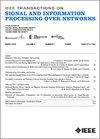针对恶意攻击的固定步长弹性分布式优化算法
IF 3
3区 计算机科学
Q2 ENGINEERING, ELECTRICAL & ELECTRONIC
IEEE Transactions on Signal and Information Processing over Networks
Pub Date : 2025-09-24
DOI:10.1109/TSIPN.2025.3613875
引用次数: 0
摘要
分布式优化问题的求解依赖于多智能体网络中节点间的信息交换。在存在恶意攻击的不可靠网络环境下,受损节点故意传播伪造数据,破坏优化过程。通过设计容错机制(FTM)和弹性分布优化(RDO)算法,可以提高多智能体系统的安全性和鲁棒性。本文提出了一种基于K-Medoids聚类(M-FTM)的容错机制来解决恶意攻击带来的挑战。与现有的$ F$-local过滤机制相比,M-FTM将网络连通性要求从$ (2F +1)$-robust降低到$ (F +1)$-robust,其中$ F$为网络中恶意节点的数量。针对高维优化问题,提出了弹性DIGing算法和固定步长弹性Push-DIGing算法。通过一致性和收敛性分析验证了算法的有效性。数值实验表明,该算法能够有效抵御恶意攻击。此外,M-FTM不仅使算法的运行效率提高了一倍,而且可以在低网络连接条件下运行。本文章由计算机程序翻译,如有差异,请以英文原文为准。
Resilient Distributed Optimization Algorithm With Fixed Step Size Against Malicious Attacks
Solving distributed optimization problems relies on information exchange between nodes in multi-agent networks. In an unreliable network environment with malicious attacks, compromised nodes deliberately disseminate falsified data to disrupt the optimization process. The security and robustness of the multi-agent system can be improved by designing the fault-tolerant mechanism (FTM) and the resilient distributed optimization (RDO) algorithm. This paper introduces a new fault-tolerant mechanism based on K-Medoids clustering (M-FTM) to address the challenges posed by malicious attacks. Compared with the existing $ F$ $ (2F +1)$ $ (F +1)$ $ F$
求助全文
通过发布文献求助,成功后即可免费获取论文全文。
去求助
来源期刊

IEEE Transactions on Signal and Information Processing over Networks
Computer Science-Computer Networks and Communications
CiteScore
5.80
自引率
12.50%
发文量
56
期刊介绍:
The IEEE Transactions on Signal and Information Processing over Networks publishes high-quality papers that extend the classical notions of processing of signals defined over vector spaces (e.g. time and space) to processing of signals and information (data) defined over networks, potentially dynamically varying. In signal processing over networks, the topology of the network may define structural relationships in the data, or may constrain processing of the data. Topics include distributed algorithms for filtering, detection, estimation, adaptation and learning, model selection, data fusion, and diffusion or evolution of information over such networks, and applications of distributed signal processing.
 求助内容:
求助内容: 应助结果提醒方式:
应助结果提醒方式:


